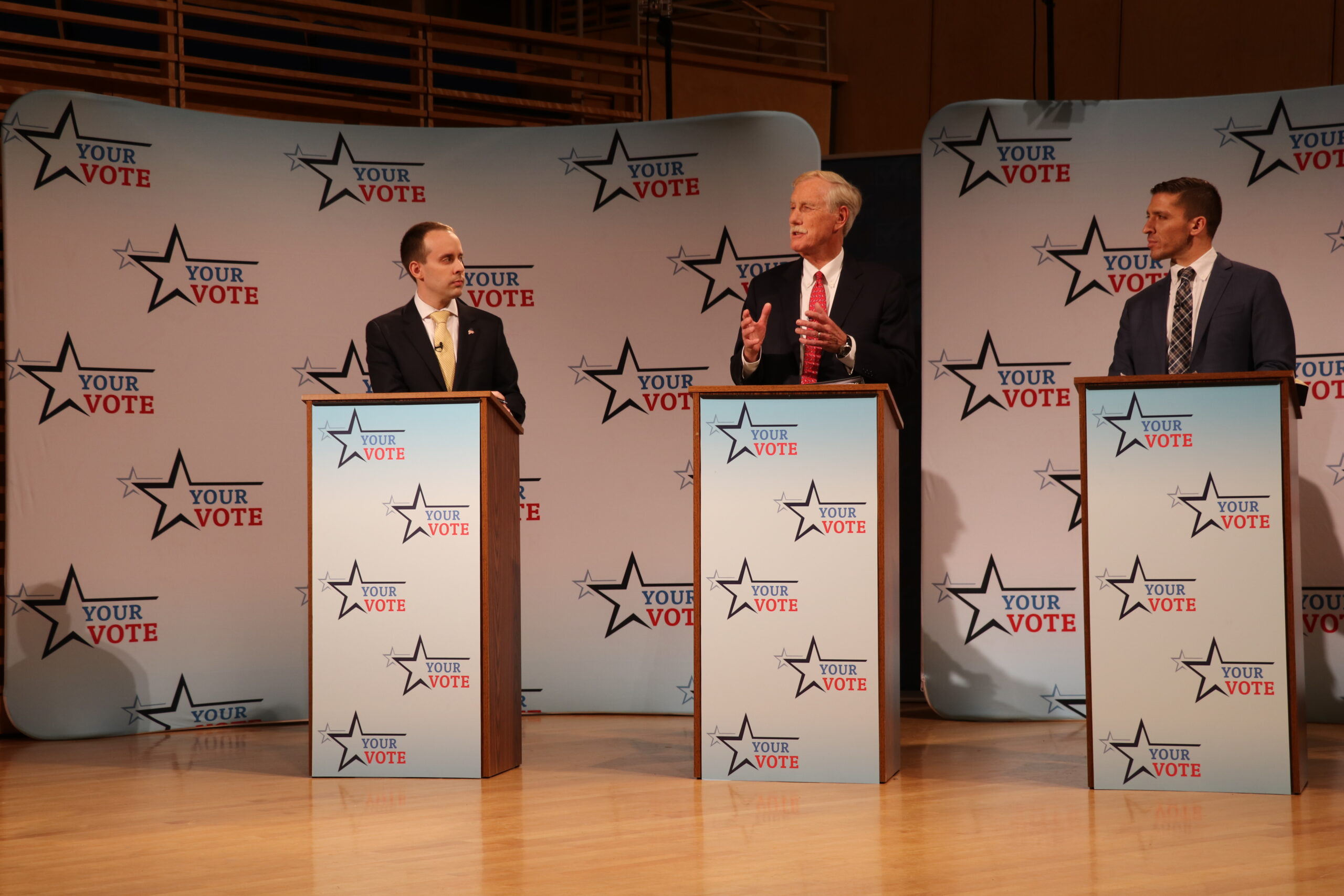Studzinski debates highlight differences, turn testy
November 2, 2018
 Alyce McFadden
Alyce McFaddenCandidates for two of Maine’s seats in Congress took to the stage in Studzinski Recital Hall on Tuesday afternoon for two debates preceding the November 6 election.
The first debate, for U.S. Senate, featured independent incumbent Angus King and two challengers—Republican Eric Brakey, a current state senator, and Democrat Zak Ringelstein, a former teacher. The tone quickly turned testy, with Ringelstein urging Brakey to drop out of the race over anti-immigration tweets that the Democrat said were “inciting violence,” accusations that Brakey called “ridiculous” and “childish.”
The candidates differed sharply on the issue of healthcare. King highlighted the need to reduce prescription drug costs, whereas Ringelstein, who supports Medicare-for-All, attacked the incumbent for “talking around problems.” Brakey said the answer lay in “market-based conclusions” and confirmed that he would vote to repeal and replace Obamacare if given the opportunity.
Not all moments were antagonistic, though. In a section of the debate where candidates asked each other questions, Ringelstein asked King if the senator would stop taking money from ExxonMobil and return the company’s previous contributions. King said yes, and the pair shook hands.
All three candidates said they supported the legalization of marijuana at the federal level, and all three agreed that they opposed the proposed Central Maine Power transmission line, which would cut through Somerset County.
But the three diverged again in their closing statements. Brakey encouraged voters to stand up to special interests in Washington.
“We’ve been getting a rotten deal as Maine people,” he said.
Ringelstein highlighted the role of ranked-choice voting, encouraging his supporters to back King with their second-choice vote.
“Rank me one and Angus two,” he said.
King, taking a different approach, questioned why the debate hadn’t addressed the opioid crisis and the isolation of seniors in rural Maine.
After the debate, both King and Ringelstein met with small groups of students at organized events, while Brakey discussed his positions on climate change and gun control with students in Studzinski before he had to leave for another event. All three candidates had another debate later that night, hosted by WGME in Portland.
The Senate debate was followed by the another debate with candidates for the House of Representatives. Incumbent Democrat Chellie Pingree, representing Maine’s first district, faced off against Independent Marty Grohman, a state representative from Biddeford, and Republican Mark Holbrook, a Brunswick native with a PhD in psychology.
The tone of the House debate was calm compared to that of the earlier Senate matchup. In one moment, Grohman presented his opponents with gifts—a Whitman’s Sampler box of chocolates for Holbrook and the book “Keeping a Family Cow” for Pingree—rather than questions. The book was written by Grohman’s mother.
The candidates differed on the issue of healthcare, with Holbrook arguing for a piece-by-piece repeal of the Affordable Care Act (ACA).
“The federal government doesn’t do anything very well,” he said.
By contrast, Pingree, who voted for the ACA when it passed in 2010, noted her sponsorship of a bill that would make it easier to buy prescription drugs from Canada at lower prices.
On the subject of hate speech and incivility, Holbrook highlighted the “moral degradation” of society.
“We have to get people focused more outside of themselves and looking to a higher power,” he said. “I don’t care what their faith is, but they ought to be looking towards God to help guide them in their ordinary course throughout the day as opposed to looking inside themselves and saying, ‘I’m justified in this righteous indignation.’”
Pingree said that, as a leader, it was important to have friends on the other side of the aisle, but she later questioned this idea of both-sideism with respect to incivility and hate speech.
“There are people on my side of the aisle that have been too outspoken … but we have to draw a clear line about what’s really hate speech, white supremacy, what happened at the synagogue, anti-Semitism,” she said. “These things are seriously wrong, and we have to call them out when we see them. We cannot just say both sides are in the wrong.”
Grohman, on the other hand, highlighted his credentials as an independent, arguing he could help bridge the political divide where partisan candidates fail.
“We have gotten to a really divisive time in our country, and I think it is because we have just kind of split into these two teams,” he said. “It’s time we had voices that were in the middle, and as an independent, I am uniquely able to work with members of both parties.”
Both debates were hosted by Maine Public Broadcasting Network as part of the “Your Vote 2018” series.
Julia Katter contributed to this report.

Comments
Before submitting a comment, please review our comment policy. Some key points from the policy: